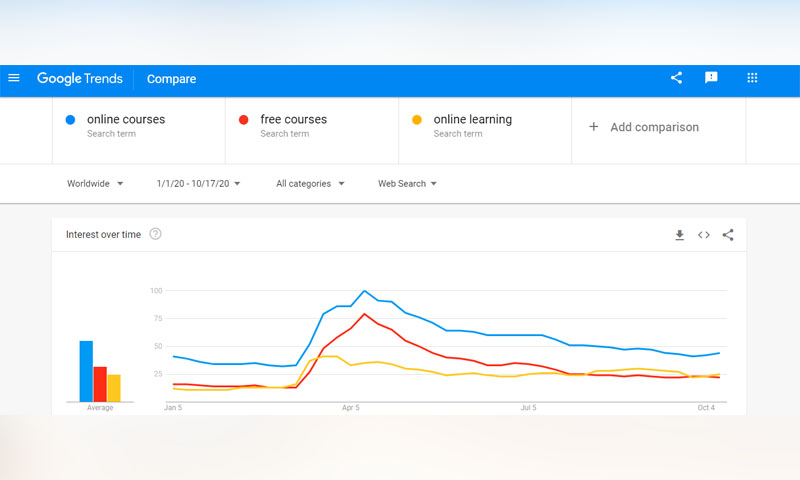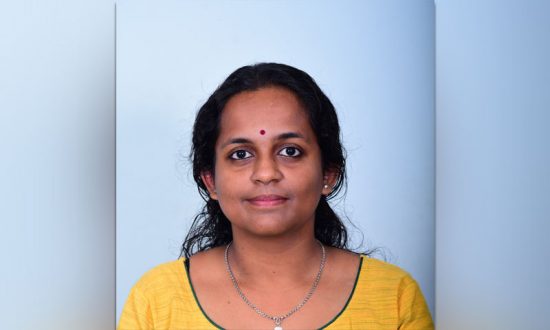Dr Vani Lakshmi R holds a doctoral degree in Statistics from Pondicherry University (A Central University, India). She is passionate about data in its multi-faceted manifestations and has been actively involved as a free-lancer in projects in the domains of arts and humanities, management sciences, life sciences and public health before joining Manipal Academy of Higher Education as an Assistant Professor in Data Science. Her research articles have been published in peer-reviewed journals of high repute. When away from work; she is seen engrossed in e-learning (completed 200+ courses on various platforms), reading, creative writing, photography and art in its multiple manifestations
Until a decade ago, little was known about e-certifications except for the occasional information on Microsoft or SAS certifications among others; which were popular choices among professionals. For a layman, online certifications were considered expensive and not as relevant as a full-time/part-time programme in a reputed educational institution. However, the same period also witnessed gradual adaption to embrace knowledge through mobile applications. Be it, online support for preparation for competitive examinations (e.g. Unacademy) or an add-on e-support to the academic curriculum (e.g. Byju’s App), we have slowly drifted towards mechanisms to prepare ourselves to minimize the micro-imbalances in the delivery of quality education globally. The rising aspirations of the Indian middle-class to ensure that the “best” form of education is delivered at the doorstep has fueled the parallel rise of e-learning paradigm as a powerful alternative to the existing framework.
While technology might appear to be a recent phenomenon triggered over half-a-century ago, humanity has always been subjected to novel experiences which date back to 1920s when Prof. SL Pressey of Ohio University devised the “testing machine” to administer and score multiple-choice questions (MCQs) to students. Prof. BF Skinner of Harvard University is credited with the concept of “teaching machine” and programmed learning in the curriculum. Through his acclaimed work “The Technology of Teaching”, he emphasized on the purpose of education which was centred on teaching repertoires of both verbal and nonverbal behaviour; as well as to sustain the student interest in learning.
In line with the advent of computers, in the 1960s, University of Illinois developed the PLATO (Programmed Logic for Automatic Teaching Operations), a computer-based training (CBT) network. This is often considered to be the first instance of a virtual learning experience. In the following years, education gained new dimensions with the advancements in technological capabilities.
According to a report featured in the New York Times, the year 2012 is regarded as the “Year of Massive Open Online Courses”. Often termed as MOOCs, it refers to online courses aimed at unlimited participation and open access via the web. The year witnessed the birth of several popular e-learning providers including Coursera (founded by Professors from Stanford University) and edX (Harvard University). While MOOC providers firmly believe that e-learning cannot be considered a stand-alone option for education, developments in recent years have made us think otherwise. MOOCs are also considered to be a path-breaking paradigm towards achieving SDG 4 which is related to ensuring ‘inclusive and equitable quality education and promote lifelong learning opportunities for all’.
In 2017, the MHRD (Ministry of Human Resource Development) and AICTE (All India Council for Technical Education) together with Microsoft under Digital India launched Study Webs of Active-Learning for Young Aspiring Minds (SWAYAM); a MOOC platform offering a wide range of courses through faculty from premier institutions of the country including IITs, IIMs and IISERs.
The Covid-19 pandemic has revitalized the online learning paradigm and the students as well as the academia have been enthusiastically overcoming challenges induced by the socio-economic differences across the country.
Data from Google Trends (see Figure 1) highlight increased searches on online courses/free courses/online learning during the lockdown worldwide. Similar trends could be witnessed in our country as well.

Students and professionals were particularly attracted to online learning due to reasons including (not limited to) fulfilment of criteria specified by their institution/organization, increased interest in learning and availability of a wide variety of courses at no cost during the lockdown period. Moreover, e-certifications add considerable value to the career profiles which might pave way for better job opportunities. Covid-19 can also be seen as an opportunity for the teachers to step into the shoes of e-learning.
Learning is a never-ending process. Online education and social media serve as relatively new mediums to quench the thirst for learning and academia is no exception. While one might ponder on why teachers need to explore e-learning possibilities, there are several reasons to pursue this direction.
Firstly, MOOCs serve as an exciting platform to gain fresh perspectives on concepts mastered years ago. It enables teachers to revisit/relearn familiar ideas thus, paving way for different approaches to communicating the same to students who are geographically far apart. This will serve as an excellent supplement for better student engagement, easier comprehension and thus enable the student community to overcome the Covid-19 induced learning challenges. Moreover, teachers can utilize MOOCs to engage students in self-directed as well as project-centric learning.
As teachers plunge into e-learning, it enhances their ability to offer students with real-problems and case studies (problem-based learning) as e-education is increasingly encouraging participation from the industry. With corporates like Microsoft, IBM, SAS and Google venturing into this sphere, teachers are offered abundant possibilities to prepare students to the job market through e-learning. Thus, teachers get to identify redundant concepts which can be restructured and refined to ensure that the students are transformed into employable citizens.
Secondly, the universe of knowledge is expanding at a faster pace, thanks to the ever-growing technology and computing capabilities. Education never meets a dead end and self-paced e-learning enables teachers to stay updated in their domain of expertise and pass on the same baton to the student community.
Thirdly, multi-disciplinary learning is the need of the hour and MOOCs serve as an excellent treasure trove of knowledge to explore new terrains in the domains yet to be explored. This would enable the teacher to widen the horizons of learning and add more breadth to the teaching process.
Fourthly, most of the MOOC providers enable the teachers to audit the course and this serves as a mechanism to imbibe high-quality MOOCs into the existing academic curriculum in line with the changing possibilities offered by educational policies set forth from time to time. With the realization that blended learning and flipped classrooms are here to stay, this will pave way for globalization of education where students get access to utilize the services offered by renowned names in a required field of expertise through MOOCs. Upon an understanding that the courses are satisfactory, teachers can get certified as well which will fuel their career growth and professional development.
The grass is green on both sides and the incorporation of e-learning tools along with the existing educational system will transform the student community to job-ready professionals who can progress with an exciting career in research institutions as well as corporates of repute. With vocational and entrepreneurial skills, students can also evolve into job providers in the years to come. The recently released National Educational Policy envisions a generation of skilled and knowledgeable citizens. The keys to this realistic goal lie in motivated, energized and capable teachers. As a teacher, it could be a Covid-19 induced chance encounter with e-learning. Nevertheless, it is a welcome encounter for the world as we prepare for more insightful academic endeavours.




